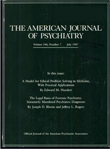Severity of psychiatric symptoms as a predictor of benefits from psychotherapy: the Veterans Administration-Penn study [published erratum appears in Am J Psychiatry 1989 Dec;146(12):1651]
Abstract
One hundred ten nonpsychotic opiate addicts were randomly assigned to receive paraprofessional drug counseling alone, counseling plus cognitive-behavioral psychotherapy, or counseling plus supportive- expressive psychotherapy. Patients were classified low-severity, mid- severity, or high-severity on the basis of the number and severity of their psychiatric symptoms. Overall, the addition of professional psychotherapy was associated with greater benefits than was drug counseling alone. Low-severity patients made considerable and approximately equal progress with added psychotherapy or with counseling alone. Mid-severity patients had better outcomes with additional psychotherapy than with counseling alone, but counseling did effect numerous significant improvements. High-severity patients made little progress with counseling alone, but with added psychotherapy made considerable progress and used both prescribed and illicit drugs less often.
Access content
To read the fulltext, please use one of the options below to sign in or purchase access.- Personal login
- Institutional Login
- Sign in via OpenAthens
- Register for access
-
Please login/register if you wish to pair your device and check access availability.
Not a subscriber?
PsychiatryOnline subscription options offer access to the DSM-5 library, books, journals, CME, and patient resources. This all-in-one virtual library provides psychiatrists and mental health professionals with key resources for diagnosis, treatment, research, and professional development.
Need more help? PsychiatryOnline Customer Service may be reached by emailing [email protected] or by calling 800-368-5777 (in the U.S.) or 703-907-7322 (outside the U.S.).



